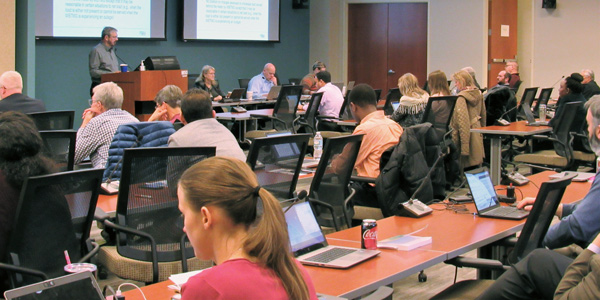By Amanda Durish Cook
CARMEL, Ind. — After six months of little progress, stakeholders are now asking MISO to consider changing its billing practices to reflect how behind-the-meter resources use the transmission system.
But the RTO says it’s still collecting stakeholder input before it develops an official stance on multiple BTM measures.
“In large part, we’re still in listening mode here,” MISO Director of Planning Jeff Webb said at a March 14 Planning Advisory Committee meeting.
The RTO is still working with stakeholders to determine whether it should account for net or gross BTM load when it assesses network integration transmission service.
“I think that’s the debate here: whether behind-the-meter uses the transmission system for load, uses it sufficiently enough or uses it on peak,” Webb said. “Under what circumstances are costs incurred [from load typically served by BTM generation] when building the transmission system?”
The RTO must also settle on planning study assumptions for both registered and unregistered BTM generation and determine whether BTM retirements should be subject to a formal Attachment Y notice and subsequent reliability studies.
Last year, WEC Energy Group proposed that all resources be required to register with MISO as a network resource before being authorized to fulfill capacity obligations. That proposal aligns with an existing RTO plan to implement a one-time deliverability test for BTM generators that could trigger a requirement to acquire network service in an upcoming capacity auction. (See WEC Takes Stab at MISO Behind-the-Meter Definition.)
Webb said MISO will continue to discuss how to plan for BTM generation at the PAC’s April meeting and that the conversation would likely extend until the end of the year.
“We’ll make some sort of strawman proposal and let people beat up on that for awhile until we get something,” Webb said. “Let’s keep the dialogue going here.”
Stakeholders: Tx Charge Rewrite?
The question of how to bill BTM generation for transmission use sparked a larger conversation on revising transmission use charges in the face changing load shapes in MISO.
Veriquest Group’s David Harlan said MISO is headed for a future of more complex and “spiky” load shapes attributable in part to BTM generation, possibly requiring the RTO to reassess how it bills for transmission use.
“In the past we’ve expected load shapes to be fairly predictable and planned around peak. I think what we’re increasingly seeing is that when you connect to the transmission or distribution system, there’s an option value. You can either inject or withdraw. What’s the proper way of accounting for that option right?”
Wisconsin Public Service’s Chris Plante said his company has also been discussing a more nuanced approach to transmission billing.
“I think more and more we’re not just building transmission for the peak, but for energy withdrawal,” Plante said.
Representing Illinois Industrial Energy Consumers, Jim Dauphinais said he’d like to see the transmission charge issue contained within the broader BTM subject, noting that MISO’s Regional Expansion Criteria and Benefits Working Group is responsible for proposing transmission cost-sharing policies.
Webb said he supported limiting the issue to how MISO plans for and bills for BTM generation ― for now.
“I think maybe we bite off what we can here,” Webb said. “I think we’re in a — every generation says this — but we’re in a transitional period. There’s growing uncertainty about the load that we plan for.”






